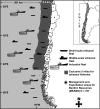Navigating transformations in governance of Chilean marine coastal resources
- PMID: 20837530
- PMCID: PMC2947917
- DOI: 10.1073/pnas.1012021107
Navigating transformations in governance of Chilean marine coastal resources
Abstract
Marine ecosystems are in decline. New transformational changes in governance are urgently required to cope with overfishing, pollution, global changes, and other drivers of degradation. Here we explore social, political, and ecological aspects of a transformation in governance of Chile's coastal marine resources, from 1980 to today. Critical elements in the initial preparatory phase of the transformation were (i) recognition of the depletion of resource stocks, (ii) scientific knowledge on the ecology and resilience of targeted species and their role in ecosystem dynamics, and (iii) demonstration-scale experimental trials, building on smaller-scale scientific experiments, which identified new management pathways. The trials improved cooperation among scientists and fishers, integrating knowledge and establishing trust. Political turbulence and resource stock collapse provided a window of opportunity that triggered the transformation, supported by new enabling legislation. Essential elements to navigate this transformation were the ability to network knowledge from the local level to influence the decision-making processes at the national level, and a preexisting social network of fishers that provided political leverage through a national confederation of artisanal fishing collectives. The resultant governance scheme includes a revolutionary national system of marine tenure that allocates user rights and responsibilities to fisher collectives. Although fine tuning is necessary to build resilience of this new regime, this transformation has improved the sustainability of the interconnected social-ecological system. Our analysis of how this transformation unfolded provides insights into how the Chilean system could be further developed and identifies generalized pathways for improved governance of marine resources around the world.
Conflict of interest statement
The authors declare no conflict of interest.
Figures



References
-
- Jackson JBC, et al. Historical overfishing and the recent collapse of coastal ecosystems. Science. 2001;293:629–637. - PubMed
-
- Berkes F, Folke C. In: Linking Social and Ecological Systems: Management Practices and Social Mechanisms for Building Resilience. Berkes F, Folke C, editors. New York: Cambridge Univ Press; 1998. pp. 342–362.
-
- Pauly D, et al. Towards sustainability in world fisheries. Nature. 2002;418:689–695. - PubMed
-
- Worm B, et al. Impacts of biodiversity loss on ocean ecosystem services. Science. 2006;314:787–790. - PubMed
Publication types
MeSH terms
LinkOut - more resources
Full Text Sources

